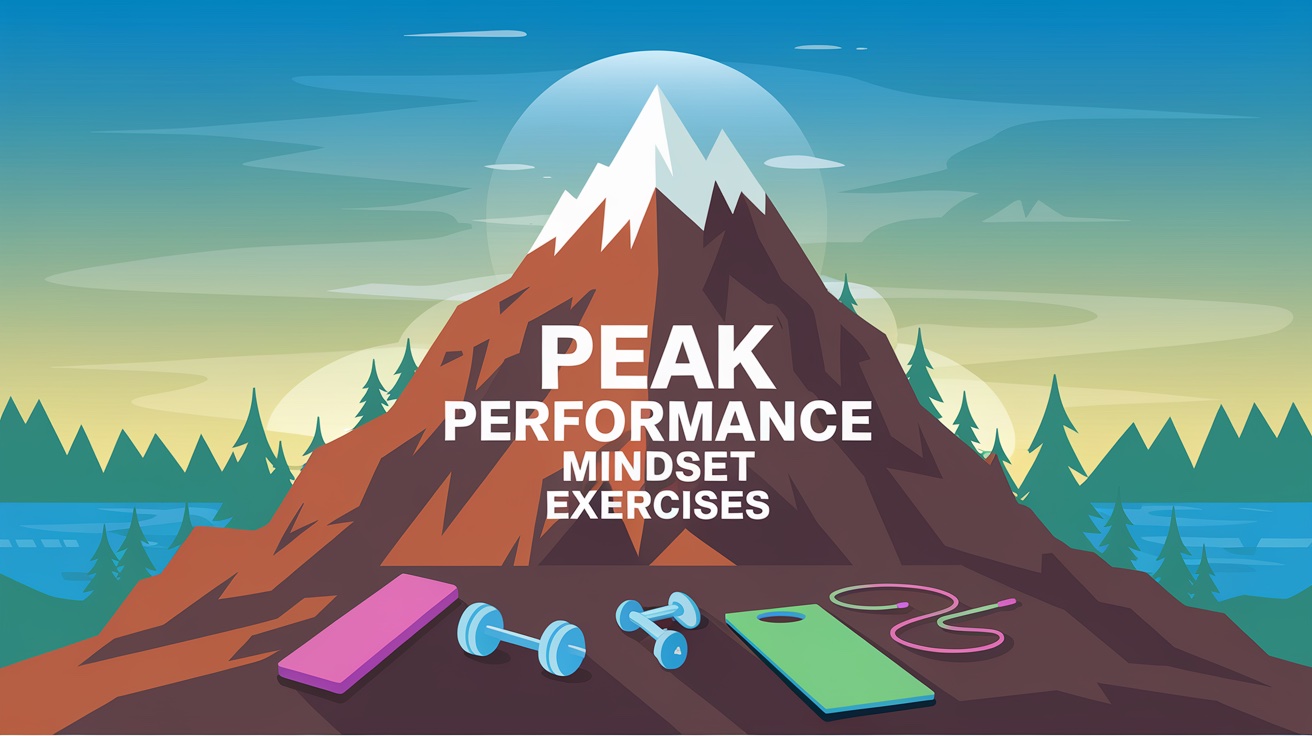Why a peak performance mindset matters
Here’s the thing… a Peak Performance Mindset isn’t just some self-help mumbo jumbo—it’s the secret weapon for entrepreneurs and ambitious types who actually want to win. Without it? You’re just throwing spaghetti at the wall. But with the right mindset? You’re focused, you’re consistent, and more importantly—you’re making moves that actually matter.
It’s the ability to maintain focus, manage emotions, to move yourself to action even when you don’t feel it, and execute skills flawlessly, especially during high-pressure situations, or when you’ve just faced a setback.
Your business, your success—it all starts in your head. So, if you’re serious about levelling up, stop talking and start thinking like someone who gets stuff done.
How does mental training contribute to peak performance?
Alright, so here’s the deal: mental training is your path to increase your performance, whether you’re running a business, freelancing, building a personal brand, or creating a fulfilling life.
In other words it’s about not allowing your brain to talk you out of doing the things you need to do, to achieve the results, think moolah, you want to have.
It’s how you strengthen your focus, emotional control, and resilience—basically, getting your head straight so you can make better decisions, handle setbacks like a pro, and boost your confidence.
Imagine clearing out all that mental clutter and hitting your goals with laser-sharp clarity. When you’ve mastered the mental game, you’re playing at a whole new level.
It’s no surprise that business and sports success is the exception not the norm. Most people don’t treat their mind like a muscle. It’s need to be trained. To be conditioned for success.
What Can You Learn From Top Athletes On Training Your Mind For Improved Mental Performance?
Success starts within. Sports psychologists have known this for decades. Which is why they’ve developed strategies & techniques which champion athletes use for mental preparation.
Physical talent isn’t enough. When every athlete is perfectly conditioned the only edge you have left is found through mental coaching.
So let’s get into 10 mental strategies champions use which take your game to the next level.
…from here….
Top Athletes Reveal The Mind Exercises You Can Use to Win In Business & Life
Let’s break down some of the most effective techniques these top athletes use to crush their goals and stay ahead of the competition. The same strategies can take your business performance to the next level.
1. The Victory Visualization: Where Mental Training For Peak Performance Began
Imagine this: Close your eyes and picture yourself nailing your biggest goal. Now really dive in—what do you see, hear, and feel? Make it real. The sweat, the cheers, the thrill of crossing that finish line.
Make the picture bigger. Make the colours brighter. Increase the volume of the sounds.
This is visual rehearsal on steroids.
Here’s the kicker: doing this for just 5 minutes a day can boost your performance by up to 13%. So, what if that tiny daily habit gave you the edge to actually crush your goals? Try it, and watch your results skyrocket.
2. The Gratitude Gauntlet: The Missing Piece in the Mental Game
Here’s a brain hack: Every morning, write down three things you’re grateful for. Then, push yourself throughout the day to find three more unique things to be thankful for. Sounds simple, but here’s the magic—this challenge **rewires your brain** to start spotting positivity and abundance everywhere.
Think about it: How much could your mindset and focus shift if you’re always on the hunt for the good stuff? This exercise flips your mental script from scarcity to success. Ready to try?
3. The Failure Reframe to Transform Your Emotional State
Got a recent setback that stings? Perfect. Now list three lessons or opportunities that came out of it. Here’s why this matters: every time you do this, you’re training your brain to **turn obstacles into opportunities**.
Instead of getting stuck in frustration, you start seeing failures as stepping stones. Imagine how much faster you’ll bounce back from challenges when you can flip setbacks into fuel for growth. Time to build some serious resilience. Ready to reframe your next failure?
4. Success Starts With The Power Pose
Before any big event, try this: stand in a power pose—hands on hips, chest out—for two minutes. Why? Because science says it works.
Every emotional state has an associated physiology. How you stand. How you breathe. The expression you put on your face.
This simple move can boost your confidence and drop stress hormones by up to 25%. Imagine walking into a meeting, pitch, or presentation with that kind of edge. It’s like flipping a switch that tells your brain, “I’ve got this.” So, why not give it a shot? Your body language could be the secret weapon you didn’t know you had!
I do this just before I step out on stage for any big presentation.
5. Top Athletes Reveal The Mind -ful Minute
Here’s a quick hack for instant focus: set a timer for one minute and just focus on your breath.
That’s it—nothing fancy, just you and your breathing.
This simple meditation technique sharpens your focus and kicks anxiety to the curb. The trick? Consistency. Do it daily, and you’ll feel more centered, clear-headed, and ready to tackle whatever comes your way.
It’s a one-minute game-changer. Give it a try.
6. The Goal Ladder Exercises They Use to Excel
Got a massive goal that feels impossible?
This will take you out of overwhelm because it’s one of the top mind exercises they use.
Make it manageable: break it down into 10 smaller steps.
Each day, take action on the next step.
This simple but powerful technique makes even the biggest goals feel doable and, more importantly, builds serious momentum.
Every small win moves you closer to the finish line. Before you know it, you’re knocking out steps and getting closer to crushing that big goal. Start climbing.
7. The Affirmation Avalanche: One of the Simplest Mind Exercises They Use
Want to program your mind for success? Create a list of 10 powerful affirmations that align with your goals and repeat them out loud every morning like you mean it. This floods your subconscious with positive energy and sets you up to win.
Examples:
– “I am unstoppable in achieving my goals.”
– “Every challenge I face is a step toward success.”
– “I attract opportunities that align with my vision.”
Say them with conviction daily, and watch how fast your mindset shifts. Ready to unleash that power?
The Comfort Zone Crusher: A Core Component of Any Mental Training Course
Here’s where the magic happens: once a week, do something that scares you—whether it’s public speaking, trying a new sport, or having that tough conversation you’ve been avoiding.
Growth doesn’t happen in the safe zone; it happens when you stretch yourself beyond what’s comfortable. Push those boundaries regularly, and watch your confidence and abilities skyrocket.
Remember this: Fear is just fuel for levelling up.
9. The Feedback Loop to Find Improvements Fast
Want to level up fast? After each performance, task or day, ask yourself these three questions:
1. What went well?
2. What could be improved?
3. What’s one action I’ll take next time?
This simple reflection process keeps you learning, improving, and sharpening your skills. It’s like your personal upgrade system that speeds up progress, helping you make smarter moves every time.
The strategies champions use to win don’t just come from doing—they come from reflecting, finding the lessons and improving. As an added bonus using a journal for this is also learning how to focus.
10. The Energy Audit: Know When to do the Hardest Tasks
Want to unlock your peak performance windows? Here’s the move: for one week, track your energy levels every hour.
Note which activities light you up and which ones drain you.
By the end of the week, you’ll have the data to optimize your schedule around your high-energy times.
It’s all about working smarter, not harder, so you’re hitting your best stride when it matters most.
For me, I find anything which requires a lot of brain power I do in the mornings. Afternoons I can do the other stuff, like web design, publishing content I’ve already done or presentation slides.
How can I track my progress in mental training?
Tracking progress in mental training is crucial for maintaining motivation and identifying areas for improvement.
One effective method is keeping a mental training journal, where you can record your daily exercises, thoughts, and observations.
You can also use performance metrics to gauge the impact of your mental training.
Many athletes & entrepreneurs find it helpful to work with a mental performance coach who can provide objective feedback and assessments.
Additionally, periodically reassessing your goals and mental state can help you recognize progress and adjust your training as needed.
Conclusion: Your Mental Training For Peak Performance Starts Now
You’ve now got 10 powerful tools to forge your peak performance mindset.
The trick? Consistency. Start small, but start today. Each tiny step builds mental strength, and trust me—your future self will thank you.
Picture yourself 30 days from now—more confident, more resilient, and absolutely ready to crush any challenge in your way. That version of you is within reach. All it takes is commitment and daily practice.
So, here’s the question: Which one are you starting with?
Here’s an extended FAQ with questions and answers for “Mental Training For Peak Performance Mindset: 10 Powerful Techniques”
1. What is a peak performance mindset and why is it important?
A peak performance mindset is a state of mind that allows individuals to perform at their highest level consistently. It’s crucial because it enables top athletes and professionals to achieve exceptional results. This mindset combines focus, confidence, and resilience, which are essential for success in any field. By developing a peak performance mindset, you can enhance your ability to handle pressure, overcome obstacles, and maximize your potential in both sports and life.
2. How does mental training contribute to achieving peak performance?
Mental training is a foundational aspect of achieving peak performance. It helps athletes and professionals develop the psychological skills necessary to perform at their best when it matters most. Mental training for peak performance includes techniques such as visualization, self-talk, and goal-setting. These practices strengthen mental toughness, improve focus, and enhance confidence, all of which are critical components of a peak performance mindset.
3. What are some effective mental training techniques recommended by sports psychologists?
Sports psychologists often recommend a variety of mental training techniques to improve your mental game. Some powerful methods include: 1. Visualization: Mentally rehearsing successful performance 2. Positive self-talk: Using encouraging internal dialogue 3. Mindfulness meditation: Enhancing focus and presence 4. Goal-setting: Establishing clear, achievable objectives 5. Arousal regulation: Managing energy levels for optimal performance These techniques, when practiced consistently, can significantly enhance mental performance and contribute to a peak performance mindset.
4. How can I develop a peak performance mindset in my daily life?
To develop a peak performance mindset in your daily life, consider implementing the following strategies: 1. Set clear goals and create action plans 2. Practice positive
5. How long does it take to see results from these exercises?
A: While some benefits are immediate, significant changes typically occur after 21-30 days of consistent practice. Stick with it!
6. Can these exercises help with anxiety and stress?
A: Absolutely! Many of these techniques, especially mindfulness and visualization, are proven stress-reducers.
7. Do I need to do all 10 exercises every day?
A: Start with 2-3 that resonate most with you. As they become habits, gradually incorporate more.
8. How do these exercises compare to traditional therapy or coaching?
A: These exercises complement professional support. They’re tools for daily mental training, while therapy/coaching offer personalized guidance.

